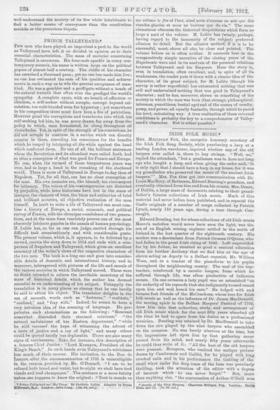PRINCE TALLDYRAND.*
-FEw men who have played so important a part in the world as Talleyrand have left it so divided in opinion as to their essential characteristics. The mass of material concerning Talleyrand is enormous. His bons-mots sparkle in every con- temporary memoir, his name is written large on the political papers of almost half a century. The riddle of his character has exercised a thousand pens ; yet no one has made him live ; no one has estimated the sum of his qualities and achieve- ments in suchia way as to win the general acceptance of man- kind. He was a gamlger and a profligate without a touch of the natural warmth that often wins the prodigal the world's sympathy. A complete cynic, with no breath of affection or idealism, a self•seeker without scruple, corrupt beyond cal- culation, too cold-blooded even for hypocrisy ; yet somewhere in his composition there mutt have been a fire of patriotism. However great. the Corruptions and treacheries into which his self-seeking led.him, he was never drawn far away from the policy to which, once formulated, he clung throughout all vicissitudes. 'Yet, in spite Of the strength of his convictions, he did not ecrliple to continuo in a service which ran directly counter to them, consoling his conscience for the benefits which he reaped by intriguing all the while against the hand which conferred them.. No one of all the brilliant statesmen whoin the Revolution and its attendant wars called forth . had so clear a conception of what was good for France and Europe. No one, when the turmoil of those tempestuous years was ever, had so large a hand in the remaking of the shattered world.. There is more of Talleyrand in Europe to-day than of Napoledn. Yet, for all that, one has no clear conception of the man. His own memoirs are, like himself, too circumspect for intimacy. The voices of his contemporaries are distorted by prejudice, while later historians have lost in the. maze of intrigue, the clamour of ware, the blaze and extinction of brief and brilliant societits„ all objective realization of the man himself. In truth to write a life of Talleyrand one must com- bine a history of Europe, a social, economic, and political survey of France, with the chronique seandaleuse of two genera- tions, and at the same time resolutely pursue one of the most obscurely intricate puzzles in the annals of human psychology. M. Loliee has, so far as one can judge, carried through his difficult task conscientiously and with considerable gusto. The present Volume, which is, it appears, to be followed by a Second, carries the story down to 1814 and ends with a com- parison of Napoleon and Talleyrand, which gives an excellent summary of the writer'e views of the respective characters of the two men. The book is a long one and goes into consider- able details of domestic and international history, and is, moreover, interspersed with pictures of the life and morals of the various societies in which Talleyrand moved. These were no doubt intended to relieve the inevitable monotony of the mass of historical details which the author has deemed essential to an understanding of his subject. Unhappily the translation is in many places so clumsy that he can hardly be said to attain his object. The translator delights, in the use of , uncouth words such as " fastuous," " restitute," " coalised," and "fray with." Indeed, he seems to have a very nebulous idea of the meaning of language. He per- petrates such abominations as the following : "Remusat somewhat distended • their • strained relations," • "the natural undulations of her Eastern deportment," " while he still caressed the hope of witnessing the advent of a mete of justice and a ray of light," and many others could be quoted hardly less deplorable. There are also many signs of carelessness, Take, for instance, this description of a famous Chief Justice : "Lord Kennyon, President of the King's Bench." In such hands even Talleyrand's witticisms lose much of their savour. His invitation to the Due de Lauzun after the excommunication of 1781 is unintelligible in the , version, provided. by Mr. O'Donnell.' "I am to be refused both .bread and water, but to-night we shall have iced viands and iced champagne The sentence is a mere fatuity 'unless one happens to know the original: Tout le monde va •• Princ6 TattOviavitt ti1 Ti.ings. B•• 146dtrio Lo1i6e. Adapted by Brian 9:Dounoll, kipsonl Jelin /Waft Ll2a. 8d. net.]
me refuses is feu et Veen, ainsi nous n'aurons ce soir que des viandes glac6es et nous no boirons qua du vin." The seine clumsiness obscures the historical disquisitions which form so large a part of the volume. M. Lolide has (wisely, perhaps', having regard to the immensity of the subject) preferred allusion to detail. But the allusive method, if it is to be, successful, must, above all else, be clear and pointed. The volume before us is often neither. It succeeds best in the comparatively simple narrative of the closing years of the Napoleonic wars and in its analysis of the personal relations, between Talleyrand and his Emperor. Here the story is, even in translation, often excellent, and, in spite of all its weaknesses, the reader puts it down with a clearer idea of the character, of its great subject, for M. Loliee (though his survey is rather superficial) has extenuated nothing that was evil and undervalued nothing that was good in Talleyrand's character ; and he has, moreover, shown us something of the society in which the man was born (that strange, philosophical. inhuman, punctilious, bestial age) and of the scenes of cruelty,. pomp, and power, all equally fantastic, through which he paced his level, calculating way. A true realization of these external conditions is probably the key to a comprehension of Talleyrand's character. But is either possible P










































 Previous page
Previous page